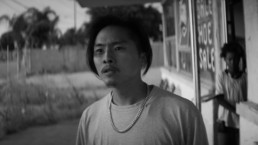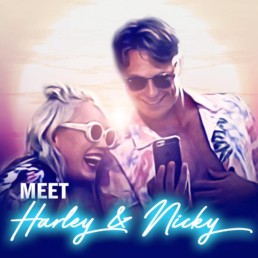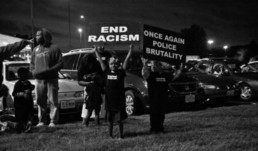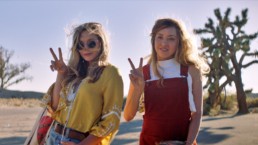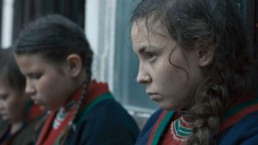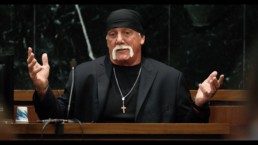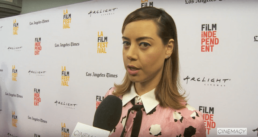Korean-American Drama 'Gook' Shows The L Riots Were More Than Just Black and White
As I was driving to my office in Koreatown earlier this week, I saw a man riding a bicycle.
He was wearing a white t-shirt with the words "End Racism" in red. It was simple, but the message held an even stronger meaning after seeing the atrocity that happened in Charlottesville, VA over the weekend. It’s no secret that race relations and culture clashes have been a dark stain on America's history, and it is even more unsettling that the continuation of those racist practices are still prevalent today.
Writer/Director/Actor Justin Chon was just a boy during the L.A. Riots of 1992. He has since taken to filmmaking to express his experience as a Korean-American living through one of the city’s most infamously tumultuous times which, until now, has generally been considered a black/white race issue. Chon’s latest film, Gook, gives audiences a fresh perspective of how the Rodney King riots also affected the Asian population living in Los Angeles at that time. From destroyed businesses to strained cross-cultural relationships, this Sundance award-winning drama uses black and white cinematography to tell a truly unique story that celebrates the artistry in diverse voices.
The timing of 'Gook' hitting theaters this Friday seems very relevant, and I urge everyone to see it.
Gook tells the story of two Korean American brothers, Eli (Justin Chon) and Daniel (David So), who struggle to make ends meet by working in their late father’s shoe store, located in the South Central neighborhood of Paramount (a stone’s throw from Compton). The brothers’ tough exterior of gold chains and foul language may seem intimidating to outsiders, but that doesn’t deter 11-year-old Kamilla (Simone Baker) from hanging around them any chance she gets. Kamilla is a street smart, orphaned black girl whose dysfunctional upbringing has her searching for the security of a family in unconventional ways. As racial tension runs at an all time high, the special bond between Kamilla, Eli and Daniel is put to the test in a major and life altering way.
Clearly, there is something special in Gook. The Sundance Audience Award winner has resonated with all who have seen it– whether it be for its bold cinematography or emotionally-charged (although at times, melodramatic) storyline, we are reminded about the importance of community during times of oppression. The L.A. riots happened 25 years ago, and judging by the state of our current political climate, we still have a long way to go until we reach liberty and justice for all. The timing of Gook hitting theaters this Friday seems very relevant, and I urge everyone to see it.
94 minutes. 'Gook' is not rated. Opening the Friday at Arclight Hollywood and the Regal LA Live Stadium Theater, nationally on August 25.
Billy Magnussen and Pom Klementieff of 'Ingrid Goes West' Talk Indie Film and Instagram
[soundcloud url="https://api.soundcloud.com/tracks/337360716" params="color=ff5500&auto_play=false&hide_related=false&show_comments=true&show_user=true&show_reposts=false" width="100%" height="166" iframe="true" /]
"I didn't use the pool, but I did take advantage of a hotel cocktail," Billy Magnussen says after I ask if he and his co-star Pom Klementieff were able to use the giant inflatable flamingo in the pool at the Fairmont Miramar Hotel in Santa Monica.
It's the perfect setting for my interview with the stars of "Ingrid Goes West"– not only is it as West as you can get without dipping your toes in the Pacific Ocean, it totally screams Los Angeles. In the Matt Spicer-directed dark comedy, L.A. is the backdrop where the loner Ingrid Thorburn (Aubrey Plaza) stalks and then befriends Instagram influencer Taylor Sloane (Elizabeth Olsen) in a fake it till you make it situation. Only Ingrid isn't faking it consciously, it's her mental illness that tricks her into thinking that social media "relationships" are real relationships. In a time when online personas are curated to the point of perfection and friendships are based on likes and comments, "Ingrid Goes West" could not be a more relevant and entertaining film for this generation. In our exclusive interview with Magnussen (Nicky Sloane) and Klementieff (Harley Chung), we talk about comparing acting to carpentry, Pop Sockets, and the difference between the various heart emojis.
Did your first job influence your passion for acting?
Pom Klementieff: I sold clothes. I hated it. I knew I didn't want to do that for the rest of my life so I think that's what brought me to acting!
I sold clothes too, so I totally understand the struggle.
Pom Klementieff: Oh my God, yeah. It's terrible, haha.
Billy Magnussen: My father is a carpenter so I grew up in a carpentry shop. We worked in these freaking-million dollar houses down in Georgia, building cabinets for these people. But meeting them... they were all characters. These people didn't exist in my everyday life.
What I also learned through carpentry is craft. You have to take the time to sand [a piece] down, to build it, to put it together. And then you get to see a product. I feel that way with acting completely. You have the months of [pre-production], shooting, editing, and then you come out and see your product.
I actually worked on [director] Matt Spicer's Kickstarter video a few years ago, he's a super cool guy. What was meeting him for the first time like for you?
Pom Klementieff: I met Matt on Skype actually. I was shooting "Guardians of the Galaxy Vol. 2" in Atlanta, and I think I bought a webcam especially for that.
Billy Magnussen: For that!?
Pom Klementieff: Yeah because my webcam didn't work on my MacBook!
"What I also learned through carpentry is craft." -Billy Magnussen

Good investment.
Billy Magnussen: Good investment, yeah! I met Matt at some restaurant off Western in Los Angeles. We had oysters. It was great.
You've both done big blockbuster movies [Pom, "Guardians of the Galaxy Vol. 2," Billy, "Into the Woods"]. Can you describe the difference between working on those sets compared to an indie film set?
Pom Klementieff: I remember having to drive myself to set [on "Ingrid Goes West"], that's kind of funny, haha. On a big production, they'll have a driver waiting for you. But I don't really care about that stuff. I love doing both! It's all about the script and the people that you work with.
Billy Magnussen: From an acting standpoint, you shouldn't tackle a project differently because of the budget. I do have to say, with a lower budget film, I feel more involved in the creation of everything. With big budgets, it's more, "We'll call you when we're ready for you."
"I do have to say, with a lower budget film, I feel more involved in the creation of everything." -Billy Magnussen

Both of your characters are so outrageous, was there any part of that character you really liked to play? Like Nicky's sweet dance moves, do you do that often in real life?
Billy Magnussen: Oh yeah I love dancing! Thanks for the "sweet" dance moves! The goal of Nicky in the film was this– Ingrid is creepy, awkward and how can you relate to this person but by having someone else who's worse. So you actually want Ingrid to win.
Pom Klementieff: Yeah, like that moment when you meet Ingrid and you take her picture. I can't remember, was that improvised?
Billy Magnussen: We did a whole bunch of takes, just messing around.
Pom Klementieff: We did a lot of improv, there was a lot I did with Lizzy [Elizabeth Olsen] that isn't in the movie like taking selfies and stuff. You know when you're taking a selfie, and you're looking only at yourself and your friend is only looking at herself, it's pathetic! Haha
So I bought this thing recently, it's called a Pop Socket. I went on a trip recently and wanted it to take better videos and pictures, and self-admittedly, I'm embarrassed to say... better selfies...
[Billy Magnussen takes my phone and starts playing with the Pop Socket]
Pom Klementieff: You know that Paris Hilton has an iPhone case that has a beautifying light?
Billy Magnussen: Social media!
"Ok, I'm boring, I think it's the two pink hearts [emoji]. Sending the single red heart is more of a commitment." -Pom Klementieff

Exactly! Haha. I talked to Matt and Aubrey [Plaza] at the LA Film Festival and asked them what their favorite emoji was. He said Prayer Hands. She said the Knife. Do you have a favorite?
Pom Klementieff: Let me check which one I use the most [scrolls through her phone]. Ok, I'm boring, I think it's the two pink hearts. Sending the single red heart is more of a commitment.
Billy Magnussen: I, ugh, I don't know...
Or do you not use emojis?
Billy Magnussen: I don't do emojis... I'm probably older than you so...
My mom uses emojis, and she's older than you, so...
Laughter
Billy Magnussen: Well she wins, haha.
Pom Klementieff: I just started emojis not too long ago. For a long time I was rejecting it, I thought it was too easy. I'd rather speak to someone.
Billy Magnussen: Too easy!? When someone sends them to me, I think "Why are you sending me poop?"
Laughter
Billy Magnussen: The most important thing with this film is to understand how people connect and communicate with each other and the problems that Instagram and in turn, society, has created has separated people. I hope "Ingrid Goes West" is a reflective mirror to really show the dangers of this fucking false world. I hope through this, people will put down their phones and really get to know someone rather than fakely follow someone. Ok, I'm going political– we elected a President who won off Twitter. That's fucked up.
"Ingrid Goes West" opens tomorrow at ArcLight Hollywood.
'Whose Streets?' Is A Powerful Call to Action
"For Michael Brown Jr."
On August 9th, 2014 – exactly 3 years ago today– an 18-year-old, unarmed black student named Mike Brown was shot and killed in Ferguson, Missouri. Just a day before, the northern suburb of St. Louis was virtually unknown to the rest of the world, but that would soon change in the most drastic of ways. Ferguson became the birthplace of the Black Lives Matter movement and garnered national attention, but the people's call to action has continued to be ignored. The documentary Whose Streets? is a look racial tension in Ferguson post-Mike Brown's death, and how residents refuse to back down until it's "liberty and justice for all."
Contributing to the emotional scope of the documentary, Whose Streets? relies heavily on user-submitted videos to capture the unfiltered chaos and confusion during those tumultuous days and nights. Not only does this force the audience into a reality check, but it also serves to empower the people with the cameras. Everyone is a filmmaker, documenting events from their unique perspectives. The social activism seen here is what they are hoping will change the world.
Last year, the documentary "Do Not Resist" highlighted the growing militarization of the police force, specifically in Ferguson, and the message is again echoed in Whose Streets?. Calling in the National Guard was a decision reached by the local (not federal, as then-President Obama makes clear) jurisdiction, and was meant to intimidate protesters into quietly packing up and going home. But the opposite happened, and instead, the violence, vandalism, and looting became worse, destroying an already broken city and pushing lawmakers, police, and residents even further from a civilized conversation and potential agreement.
Seeing a father hold up a sign reading, "Ferguson police just executed my unarmed son!!!" will never be an easy thing to digest. These films will continue to anger those who feel discriminated against and haunt those who sympathize with the victimized. Whether you are black, white, or anything in between, Whose Streets? is a captivating and culturally crucial watch.
'Ingrid Goes West' is a #nofilter Look at Superficiality in the Digital Age
We've all done it (well, most of us).
Late-night social media stalking of it-girls and pseudo-celebrities that keep us up way past our bedtime, dreaming of what life would be like if we could live a day in their shoes. In a time where studies have proven that an unhealthy attachment to social media can lead to depression and a false sense of reality, the award-winning Sundance film Ingrid Goes West is a #nofilter look at modern-day superficiality in the digital age, perpetuated by one of social media's most popular apps: Instagram.
For our red carpet interview with Aubrey Plaza and director Matt Spicer, click here
Directed by L.A. transplant Matt Spicer, this dark comedy is centered around a mentally unstable twenty-something, Ingrid Thorburn (Aubrey Plaza), a social media stalker who confuses "likes" for authentic relationships. Reaching out to a Venice Beach-dwelling "influencer", Taylor Sloane (Elizabeth Olsen), after she responded to one of Ingrid's comments, Ingrid sets her sights on becoming Taylor's best friend IRL (in real life). Ingrid moves to California and, after having tracked Taylor's every move, fashion choice, and food preference, she finally meets her idol- determined to become her new BFF.
Because of “coincidental” shared interests and hobbies, Taylor quickly invites Ingrid into her world with trips to Joshua Tree as well as tripping on acid, and to her inner circle as she meets Taylor's hippy boyfriend Ezra (Wyatt Russell) and her eccentric brother Nicky (Billy Magnussen). This quickly solidifies the relationship between the two girls, however, like all things fake and phony, both of their true colors start to seep through their heavily filtered exteriors, proving that no one is as perfect or flawless as they claim to be on Instagram.
However, like all things fake and phony, both of their true colors start to shine through their heavily filtered exterior, proving that no one is as perfect, or accurate, as they claim to be on Instagram.
Ingrid goes crazy in Ingrid Goes West and Aubrey Plaza's performance is a delicately tactile force to be reckoned with. Best known for her lack of empathy and deadpan emotion in films such as The Little Hours and the TV hit Parks & Rec, here, Plaza leaves the emo at the door and fully checks into the looney bin. She balances Ingrid's mental illness with both sympathy and vulnerability so as not to come across as cartoonish or unrelatable, and we can't get enough.
The rest of the cast successfully adds to the film’s humor and appeal. Ingrid's neighbor/Batman-obsessed boyfriend Dan (O'Shea Jackson Jr.) is the dependable comedic relief in every scene, due in large part to the fact that he is the only one seemingly grounded in reality.
Elizabeth Olsen transforms into the wellness advocate and avocado toast-eating enthusiast you love to hate. Every Los Angeles stereotype you can think of, the good, the bad, and the ugly, are on satirical display and we laugh at them until we realize we either A) know someone just like them, or B) recognize some of their qualities in ourselves. And that is the genius of Ingrid Goes West.
Director Matt Spicer definitely has something special here- together with screenwriter David Branson Smith, they have created what may be the most relevant film for millennials in 2017. While the actual events may be contemporary and generational, the message behind Ingrid Goes West could very well stand as timeless folklore for future generations.
"Ingrid Goes West" is rated R for language throughout, drug use, some sexual content, and disturbing behavior. 97 minutes. Opening this Friday at ArcLight Hollywood.
'Sami Blood' Review: A Swedish Cinderella Story – Minus the Fairytale Ending
Racism and suppression are examined through the eyes of an adolescent girl in the breakout Swedish drama, Sami Blood.
The film is director Amanda Kernall's debut feature and powerfully displays a woman who knows how to walk the fine line between childhood innocence and female empowerment. Sami Blood has screened at many prestigious film festivals including Sundance, TIFF, Venice, and more, and is now playing at Laemmle's Monica Film Center.
Sami Blood opens with an elderly woman attending the funeral of her sister in a small, Swedish farm town. Dressed differently than the other attendees and keeping her distance while they socialize, it appears that Elle Marja (Maj-Doris Rimpi) is cut from a different cloth than the other salt of the earth land laborers.
We come to understand Elle Marja's life story and her pivotal transformative moment through a flashback as the elderly Elle Marja stares out at the reindeer herders and then cuts to a 14-year-old Elle Marja. We jump to the 1930's, a time when segregation was acceptable and being of Sami heritage was looked down on by higher society. Elle Marja struggles with the grittiness of her family's lifestyle as reindeer herders and sees a way out by attending a boarding school with her sister in the quaint rolling hills of Sweden.
Though the circumstance may be different for those watching, the universal theme of struggling for acceptance is felt by all, and "Sami Blood" is a terrific example of this feeling portrayed onscreen.
By attending boarding school, Elle Marja is forced to leave her Sami heritage behind for "proper" and a more socially acceptable Swedish lifestyle. Abandoning her previous life doesn't come easy and Marja endures humiliation and bullying from her peers who are aware of her true identity. When she meets a boy, Niklas (Julius Fleischanderl), she instantly falls for him. Using a fake name and backstory, Elle Marja realizes that she can never truly escape her identity and is forced to decide whether or not to tell him the truth and risk destroying the potential of a future relationship.
Sami Blood has some of the same qualities that make Disney's Cinderella such a compelling movie. Masking one's true identity and falling in love under a guise that you are someone else, is a confusing moment in any person's life, and Elle Marja’s naivete about the situation is heartbreaking. Newcomer Lene Cecilia Sparrok, who plays a young Elle Marja, is a tempered yet powerful force on screen. Her face is so expressive and it is the subtlety of her movements that make Elle Marja so relatable in this coming of age film. Although the film’s impact may be different for each viewer, the universal theme of struggling for acceptance is felt by all, and Sami Blood is a terrific example of this feeling portrayed onscreen.
"Sami Blood" is not rated. 110 minutes. Now playing at Laemmle's Monica Film Center and the Landmark Sunshine Theater in New York.
'Nobody Speak: Trials of the Free Press' Review: Hulk Hogan Takes on the Press
New on Netflix is a documentary that sent shockwaves through Park City when it premiered at the 2017 Sundance Film Festival.
Screening the film for a crowd made up of mostly journalists and other media/ industry folk, the now infamous Gawker Media case flipped the script on the way that controversial and boundary-pushing journalism was held accountable. When Gawker made an enemy out of Terry Bollea (aka Hulk Hogan) by publishing a clip of his sex tape, they inadvertently dug their own grave. In an eye-opening look at the power and consequences of wealth and free speech, director Brian Knappenberger’s documentary Nobody Speak: Trials of the Free Press is a terrifying exposé at how the media can be controlled by the right (rich) people and the true cost of preserving one’s integrity, for better or for worse.
There is no doubt that Hulk Hogan is regarded as one of the most popular wrestlers of all time. From action figures to having his own reality TV show on MTV, Hogan’s public persona has saturated pop culture for decades. It’s no surprise then, that when the online gossip tabloid Gawker posted a grainy black and white clip of an allegedly leaked sex tape in 2012, the public was devastated. This man who was seen as an American icon had now been caught not only sleeping with his best friend’s wife but spouting off racial insults. This revelation went against everything that made Hogan so likable, but the man who appears in the tape in Gawker’s possession wasn’t Hulk Hogan– at least, that was the response that came from his camp of powerful attorneys.
Hulk Hogan and Terry Bollea are not the same person. One is a flamboyant caricature of a man while the other is a private and sensitive individual. This difference is at the pinnacle of what ignited a fierce debate throughout the media, raising the question of where does one draw the line between privacy rights and the First Amendment?
It set a frightening precedent for journalists everywhere, can the First Amendment be thwarted if there is enough money involved?
What makes this case even stranger is what happened next. Silicon Valley venture capitalist and Donald Trump supporter Peter Thiel had been anonymously funding the legal fees for Bollea and had a very pointed agenda aimed at Gawker– to bankrupt them and shut the site down for good. Thiel had a longtime feud with Gawker and saw Bollea’s case as the perfect time to strike. Years earlier, Thiel had been outed by Gawker as being gay, and despite it being true, he considered the exploitation similar to an act of terrorism. It turns out that Gawker was no match for the power of a very vengeful and rich Peter Thiel, and in true David vs Goliath fashion, was forced to shut down. In this case, money was all it took to shut down independent journalism and set a frightening precedent for journalists everywhere, can the First Amendment be thwarted if there is enough money involved?
Nobody Speak: Trials of the Free Press uses Bollea’s case as the prime example of the exploitation of the First Amendment, but his is not the only case examined. The secretive purchase of the Las Vegas Review-Journal by the politically divisive billionaire Sheldon Adelson is told firsthand by the journalists who stood up for what they believed in, which ended up costing them their jobs because they did not want to play by Adelson’s rules. And there is no shortage of footage showing President Trump undermining and disrespecting journalists with every opportunity. Aside from ridiculous and repetitive claims of the media being “fake news,” his treatment of this American right and freedom is a very real threat to democracy and a terrible message to send to the American people.
'Nobody Speak: Trials of the Free Press' is not rated. 95 minutes. Now streaming on Netflix.
'Ingrid Goes West' Red Carpet with Aubrey Plaza and Director Matt Spicer [WATCH]
Last Thursday, the dark comedy that charmed critics at Sundance had the honor of being the closing night film at the LA Film Festival. It's fitting that Ingrid Goes West was selected as the bookend to another successful festival put on by Film Independent. The indie film, which has been acquired by NEON for an August 11th release date, is a hilarious parody of Los Angeles and the way social media drives an unrealistic need for superficial "perfection."
I had the opportunity to chat with Aubrey Plaza, who plays the titular character, Ingrid Thorburn, and director Matt Spicer on the red carpet minutes before the screening took place. Since this is a film centered around the impact of social media, I asked Aubrey what her personal favorite emoji is and had Matt settle the debate on whether or not dogs should have Instagrams.
Suki Waterhouse and Ana Lily Amirpour of 'The Bad Batch' Talk Venice Beach and 'My Breast'
[soundcloud url="https://api.soundcloud.com/tracks/329722537" params="color=ff5500&auto_play=false&hide_related=false&show_comments=true&show_user=true&show_reposts=false" width="100%" height="166" iframe="true" /]
When I meet Suki Waterhouse and Ana Lily Amirpour at the London Hotel in West Hollywood, they greeted me as if I was a long-lost friend.
Instantly, we vibed and for the duration of our 15-minute interview, I was living out my fantasy of being a part of their badass girl tribe. After our interview wrapped and I had to slowly come down from cloud 9, the most amazing thing happened. Suki and Ana both said our interview was the best one they've had. Was it because we shared crazy Venice Beach stories? Read on to see...
What was your first job? Did that in any way impact your passion for filmmaking/acting?
Ana Lily Amirpour: I worked at a coffee shop as a barista in Santa Barbara. I made cappuccinos and stuff.
Suki Waterhouse: I had a couple of jobs where I dressed up as Powerpuff Girls...
ALA: What's a Powerpuff Girl?
SW: A Powerpuff Girl is a cartoon! I really didn't want to go to school, I just wanted to dress up. I was about 8 years old. I told my mom I wanted to dress up so we would find websites where you can hire people to come out [in costume]. My first proper job was working on a phone line, answering calls for people who wanted breast implants. The place was called My Breast. So I'd be like, "Hello, this is My Breast."
Laughter
ALA: Aww, my answer was like, "I work in a coffee shop."
They're like, "How weird you are inspires us." I'm just like, "Woah, you're saying that to me?" -Ana

I kept picturing Arlen as a badass Dorthy Gale from "The Wizard of OZ"...
SW: Oh my God, I was Dorthy in the "Wizard of Oz!"
No way! I must've picked up on that. Arlen's on her own trying to find her way back home and runs into a cast of characters that help her, in a way, get home. Who are the people in your life that you feel most comfortable around, or the people that inspire your creativity?
SW: I'm not really in one place ever, so sometimes I write down in my phone people's name so I remember [who to reach out to]. I like people who are similar, not ever in one place. They have lots of stories to tell me.
ALA: For me, I feel led my the film and story I'm telling into really intimate, meaningful connections with people. It's like a density of intimacy for a duration, and then life changes and you go into the next thing.
SW: It's so hard not to fall in love with everyone when you're making a movie because you get to see everyone's humanity. You're hanging out with everyone all the time, how can you not fall in love with them?
ALA: One thing that's happened to me lately, now that I'm putting out this movie and the stage of where I'm at with things, I've developed a few friendships with other filmmakers that have been really helpful for me as a filmmaker. I'm just so grateful that they are there. They're like, "How weird you are inspires us." I'm just like, "Woah, you're saying that to me?" Everybody needs someone to tell them to just keep going.
We got into this conversation and he said, "I'm trying not to be such a loser, I want to be a finder. A finder finds things, a loser loses things." -Ana

What was on your mood board when you were thinking of "The Bad Batch" world?
ALA: My whole office was covered in images of the desert, women porn, lots of books about American Desert Badlands that had fallen to crust.
SW: Hugh Hefner.
ALA: Hugh Hefner! Burning Man, the boombox obviously. The Dark Side album really inspired me. Francis Harris, Jim Phillips skateboard graphics from the 70's and 80's, Skid Row, Venice Beach...
SW: Ana took me to Venice Beach for the first time.
ALA: I had been hanging out in Venice a lot and was thinking about Comfort. One day I started talking to these very young, hippie street kids and this guy came up to me– he was very spaced out, tripping on something. We got into this conversation and he said, "I'm trying not to be such a loser, I want to be a finder. A finder finds things, a loser loses things."
SW: No!
Woah...
ALA: That's why The Screamer (Giovanni Ribisi) says that in the film. Yeah, Venice is weird, you're in the "city" but so disconnected from everything in the city.
SW: I went down there recently and saw people cleaning up a guy who had died. It's hardcore down there.
ALA: Hardcore as shit.
"It's melted cauliflower with loads of cheese that you put bread crumbs on and bake. It's incredible." -Suki

Ana, did you feel any pressure coming off of your last film, "A Girl Walks Home Alone at Night?"
ALA: I wrote "Bad Batch" when I was editing "Girl," and I didn't know how, when, if "Girl" would come out, so [no]. I never wait for external circumstances to put me in a position to tell a story. The most terrifying thing for me is the well drying up and not knowing what you want to make. I've already started writing a third one. As long as I have a place to disappear to with my imaginary friends, I feel like I'm ok. The pressure I can handle.
Ok, weird question. Say you were stuck in the desert a lá "The Bad Batch." What food would you not mind eating every day for the rest of your life?
ALA: Peanut butter and jelly sandwiches.
SW: Oh yes! That's the shit. I'd say cauliflower cheese.
Laughter
ALA: What the fuck is that?!
SW: It's melted cauliflower with loads of cheese that you put bread crumbs on and bake. It's incredible.
Oh yeah, that sounds good.
ALA: But you would eat that for the rest of your desert days?
SW: Yeah. I mean, I'd like to share some of your peanut butter and jelly sandwiches.

